Cuba’s evolving news agenda
At the Argos Theatre in Havana, Yenys Laura Prieto Velazco purchased a ticket for Diez Millones, a popular play about a Cuban family torn apart by the ideological fanaticism of the Cuban revolution and by the father’s departure to the U.S. during the 1980 Mariel boatlift.
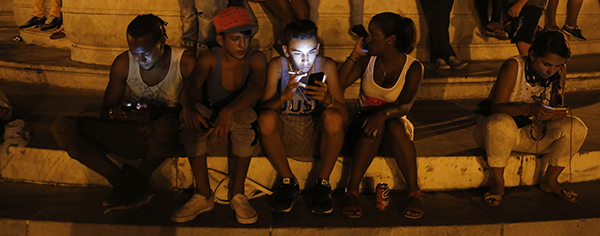
Prieto, 27, is a poet, freelance writer, and an anchor on “Buenos Días,” a TV news magazine for the state broadcaster Televisión Cubana. Although she specializes in cultural reporting, Prieto said that she did not bother proposing a story about Diez Millones for her program. She said that the very title of the play, which means “10 million” in Spanish, would raise eyebrows among her editors. It refers to a disastrous campaign between 1964 and 1970 by Fidel Castro’s government to mobilize the entire country to harvest 10 million tons of sugar.
As she sat on a bench outside the theater, next to the Plaza of the Revolution where huge crowds gather for speeches by Communist government leaders, Prieto said, “You know which stories will be accepted and which won’t.”
So why is Prieto shelling out her own money for a ticket and taking along a pen and notebook? It turns out that she now has many options to discuss the merits of the play by way of Cuba’s booming independent media. She said she planned to pitch a review of Diez Millones to one of the many news websites that have sprung up over the past five years and provide lively alternatives to censored state-run TV, radio and newspapers that, aside from Catholic Church publications, had been the only local and national news media available in Cuba since Fidel Castro seized power in 1959.
These online ventures range from 14ymedio, the first Cuba-based independent news site co-founded by dissident blogger Yoani Sánchez, to La Joven Cuba, which publishes news and blogs that are critical of, yet continue to support, the Cuban state. In addition, throngs of bloggers who now use their own bylines rather than pseudonyms regularly post their thoughts to the web, and struggling young entrepreneurs are publishing sports, fashion and entertainment webzines.
Many of these journalists have taken to heart President Raúl Castro’s December 2010 declaration that Cubans should be more critical of the government. The re-establishment of diplomatic relations between Washington and Havana in December 2014 also makes it harder for the Castro government to justify press censorship as a means to protect the nation from American aggression, said Harold Cárdenas Lema, who founded La Joven Cuba along with other professors from the University of Matanzas.
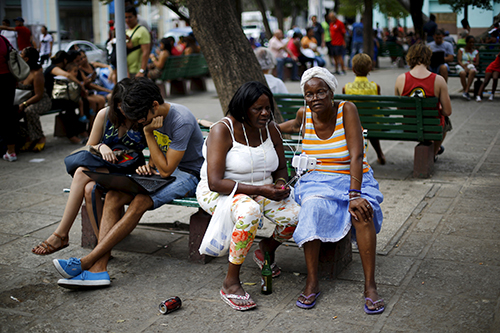
Now, independent journalists are digging into issues that were long glossed over or ignored by the official media. At times, the blogs and articles directly criticize policies and members of the Cuban government. Their scoops, in turn, sometimes prompt official news sources, such as the newspapers Granma and Juventud Rebelde, to publish follow up stories, said Ted Henken, former president of the non-profit research group Association for the Study of the Cuban Economy.
“When the independent media cover a story, the official media the next day is forced to deal with those issues because everyone is already talking about them,” said Henken, who is an associate professor of sociology and Latin American studies at Baruch College in New York.
For example, when 14ymedio broke a story last year about the killing of a transgender activist in the western city of Pinar del Río, state media wrote follow-up stories that prompted Castro’s daughter, Mariela, who heads Cuba’s National Center for Sex Education, to denounce the homicide as a hate crime.
The changes within the media represent an unprecedented loosening of press restrictions, Cuban bloggers and reporters told CPJ. Rather than leaving Cuba, many are now staying to explore these new possibilities, said Lázaro González, a 25-year-old blogger and documentary filmmaker. Journalism professors at the University of Havana—the country’s most prestigious university—praise watchdog reporting as opposed to the kind of revolutionary journalism aimed at upholding socialist values and defending the Castro regime, said González, who studied there.
Few Cubans on the island read the online content. Broadband internet access is unavailable in most Cuban homes. There are about 330 internet cafés in Cuba and dozens of publicly accessible Wi-Fi points. But the fees, usually about $2 per hour, are exorbitant in a country where most formal workers are employed by the state and earn around $30 a month.
The analytics for OnCuba show that most readers of the independent news website come from the Cuban diaspora in the U.S. and Europe, said José Jasán Nieves, the website’s associate editor. However, he and other journalists and academics contend that these stories do trickle down to readers in Cuba. They point out that many state employees have access to the internet at work and read news sites critical of the government. Mobile phone use is also widespread—the U.N.’s International Telecommunication Union figures estimate that 3.3 million Cubans have mobile phones—giving citizens access to email (though not the internet) via the standard cell signal provided by ETECSA, the state telecommunications monopoly, and the ability to read popular articles that make the rounds via email chains.
Another offline option is “The Packet,” a weekly collection of TV programs, films, and stories from international news outlets and Cuba’s independent press that are downloaded from the internet and sold to Cubans on USB sticks and DVDs for a dollar. It is estimated that half of Cuba’s population accesses content through The Packet, which is run through a network of around 45,000 people, according to an article in The Nation by Sujatha Fernandes, a sociology professor at City University of New York.
But for all the changes around the edges of Cuban journalism, the status quo remains firmly in place, with bloggers, reporters and editors still facing major restrictions and official harassment.
“There is not enough confidence in the journalists to do that kind of criticism.”
Laura Blanco Betancourt, Vanguardia
Access to the most critical independent news sites, such as 14ymedio, have been blocked for internet users in Cuba. Fears of similar action or arrest prompt many independent journalists to self-censor, according to the journalists CPJ interviewed. The government blocked access to 14ymedio just hours after it went live in May 2014 and has done the same with the Miami-based CubaNet among other critical news websites.
The Ministry of Communication did not respond to CPJ’s request for comment about harassment, arbitrary detentions, surveillance, and restrictions that Cuba’s journalists say they face.
Outside of the online journalism ventures, traditional media remain stagnant. All TV and radio stations continue to be controlled by the government and function as propaganda tools, while the distribution of independent printed newspapers and magazines, except for the Catholic Church publications, remains illegal. Or, as Sánchez told The New York Times in 2014, “In Cuba, printing presses are more guarded than military bases.”
Laura Blanco Betancourt, a reporter for the state-owned daily Vanguardia, told CPJ she believes that Cuban state media—both national and provincial outlets—have “a huge debt with the Cuban people.” Blanco Betancourt, who covers the economy and agricultural, said the media agenda is distant to the public. “Part of the responsibility relies on us, journalists, who became used to reporting on institutions rather than getting into the Cuban people’s needs and problems,” she said. Blanco Betancourt said that the directors of state media were also responsible because they “have not been able to interpret or manage the appeal of leaders of the Cuban revolution, who have clearly stated that the official press needs to get closer to the people, to report on their problems, to leave formalities behind and not to fear criticism.”
Cuba has been under international scrutiny for such a long time that “officials feel they can hide information because it is a threat to national security or can be used by the enemies of the revolution,” she said. The Vanguardia reporter added that having access to information “will help journalists to reveal corruption or official mismanagement in public services.”
Part of the problem is the way journalism is done in Cuba, Blanco Betancourt said, adding that Vanguardia barely criticizes government policies. “There is not enough confidence in the journalists to do that kind of criticism.” She admitted there should be “space” for incorporating critical views. “There has been a habit in the state media to care and protect the reputation of Communist party officials rather than criticize them,” she said. “If we continue to be complacent by trying to avoid a scandal we will become even more distant from the public we need to inform.”
Jose Ramón Vidal, a communications professor at the University of Havana and former director of the state-owned daily Juventud Rebelde, gave a similar view in an interview with a Mexican magazine. “Journalistic criticism only stays on the surface and, as a consequence, it creates false conclusions, false generalizations, which do not dig deep into the issues,” said Vidal in an interview published in Razón y Palabra. Vidal, who proposed turning state-run radio outlets into community stations, said that the “model based on propaganda is facing a crisis and should be left behind. People do not pay attention to it; it is worn out.”
Struggle for survival
Far more so than troubled media properties in the U.S. or Europe, Cuba’s new media ventures are in a fierce struggle for survival. Although some receive donations, grants and advertising from foreign entities, there is little private advertising inside Cuba. Because this area is unregulated and informal, no one knows the rules. Elaine Díaz Rodríguez said that is why, just to be safe, she lists all the donors to Periodismo de Barrio on her website.
Then, there is Cuba’s legal limbo. Most online news outlets are neither officially recognized nor prohibited, making it impossible to open corporate bank accounts or put together legal contracts in the name of these new ventures.
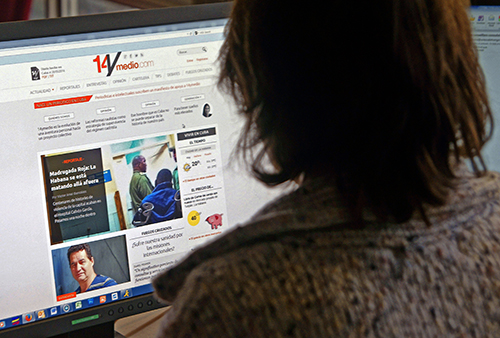
Some of the bloggers with whom CPJ spoke said they would prefer if the government established a clear set of rules, or a new media law that includes online publications. This way, they would know the boundaries and no longer fear the threat of having their sites shut down, which has led them to self-censor. Others said blurred lines were preferable, allowing them to take bigger risks in their coverage because web publications are not explicitly prohibited. Some of the newer bloggers told CPJ they fear a press law that extends to web publications could lead to a clampdown.
“Space is opening up. Things are moving and the status quo is breaking,” Miriam Celaya, one of the founders of 14ymedio, told CPJ. “But Cuba hasn’t changed as much as we would like.”
To further explore the state of journalism and free expression in Cuba, CPJ interviewed independent bloggers, reporters, editors, and online magazine publishers.
Bloggers
A former University of Havana journalism student, Carlos Alberto Pérez was stunned in 2014 when he found that answer sheets for the history, math and Spanish entrance exams for his alma mater were being sold on the street. For between $150 and $300, high school graduates, hoping for a coveted spot at the country’s best university, could essentially pay their way in.
At the time, Pérez was an editor at Tino, a computer and technology magazine. But he had also started a blog called La Chiringa de Cuba. A chiringa is a homemade kite and Pérez said that he adopted the name because he wanted to put his ideas and reports up in the air so everyone could see them. Pérez said that although Cuba’s public education system is held up as one of the triumphs of the revolution, he went after the story.
Before posting anything, Pérez, who supports the revolution, said he tried to inform the Education Ministry. But, he said, officials ignored his attempts to warn them of potential fraud and the entrance examinations went ahead. After receiving no response from the authorities, Pérez published a copy of one of the answer sheets on his blog. It was a scoop that was picked up by other Cuban bloggers and media and finally forced a reaction from the government. Education officials acknowledged the problem in an official statement, announced that the examinations would be repeated, and launched an investigation that led to the arrests of eight people.
“Half of Cuba had the answers. It did not seem right,” Pérez, 34, said while sitting on a park bench in historic Old Havana. “That was what drove me: the injustice, the corruption. And Raúl Castro said that we are supposed to denounce corruption at whatever cost.”
Pérez and La Chiringa de Cuba exemplify both the promise and the perils of Cuba’s blogosphere, which emerged in 2007 when the first blogs were written under pseudonyms and Sánchez launched her influential Generación Y blog. Sánchez, 40, and her husband Reinaldo Escobar, a journalist who had been fired from Juventud Rebelde in 1988 over a critical article on the Castro revolution, provided another boost by running a blogger academy for citizen journalists. During free workshops in their Havana apartment, Escobar taught journalism; Sánchez focused on technology and the internet; Miriam Celaya taught ethics, law and culture, while other volunteers taught photography.
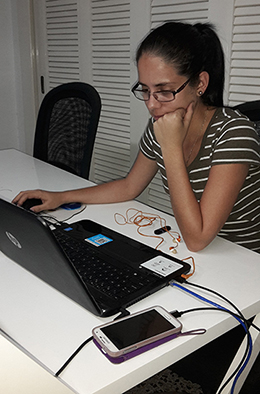
“It was a very rich experience,” Celaya said. “There was a feeling that, ‘We are going to write and do big things.’ ”
Many of these online pioneers remain unapologetically critical of the government. Escobar described this posture as a necessary counterweight to official journalism, which he said sings the glories of the revolution while glossing over its problems.
“If we try to be balanced, to reflect the bad and the good, we wouldn’t be doing our duty to balance national journalism,” Escobar told the English language Havana Times in a 2013 interview. “… official journalism sweetens reality and the alternative exposes it.”
Yet many of the new bloggers have veered away from this hypercritical stance. Today, about 3,000 blogs are based in Cuba and in Cuban communities around the world, Elaine Díaz Rodríguez, the founder of Periodismo de Barrio (News from the Neighborhood), wrote in Nieman Reports. These new blogs include a variety of styles and tones. Topics include gardening, cooking and sex. Some of the bloggers who focus on politics told CPJ that they try to pull off the delicate feat of analyzing and criticizing the government’s policies without provoking its ire.
Official backlash can take many forms. News sites and blogs deemed counter-revolutionary are blocked on the island and several of the journalists and bloggers with whom CPJ spoke said they had experienced surveillance. CPJ was unable to independently verify the allegations.
Miriam Leiva, a former diplomat and independent journalist who co-founded the dissident group Ladies in White, said she is under constant surveillance at home and believes that state agents sometimes tail her when she travels abroad. In a March blog, Leiva warned that the Cuban government’s biggest concern “is maintaining strict control on society with subtle methods that don’t damage the international image that Raúl Castro has been able to create.”
Leiva said that while surveillance is not at the level it was five years ago, she is still being watched and followed. The journalist said, “I have noticed people following me. I know that one of them is a neighbor who lives close by. I believe he acts as an informant for Cuban officials.” She said that her blog had not been attacked by online trolls, and so far she has not been prevented from covering events. But when she meets other journalists or people who are considered dissidents, she sometimes notices people following her. “The faces have become familiar, and they want me to see them,” she said. “It is a way to tell me that they know where I am going and that I am a subject of surveillance. They are trying to intimidate me.”
Another method of backlash is short-term detentions that often last for hours or days. That’s according to Roberto de Jesús Guerra Pérez, a dissident-turned-journalist who founded the news website Hablemos Press in 2009. He said that so far this year, 30 writers for Hablemos Press, which is critical of the authorities’ policies toward the press, have been detained for short periods by state agents. Guerra said the arrests lasted between three and 72 hours and that during that time, the journalists were threatened and sometimes beaten. He did not specify whether the reporters were questioned about their work, but he said that some were told that their children would lose university placements if they continued to criticize the government.
The Ministry of Communication did not respond to CPJ’s request for comment.
To avoid such problems, Alejandro Rodríguez, a 29-year-old blogger from Camagüey, said that he uses satire and irony to discuss issues such as the deteriorating state healthcare system. He said he will sometimes address small injustices, such as bribe-taking by anonymous bureaucrats, but he stays away from addressing allegations of systemic government corruption.
Yet even mild criticism can ruffle feathers. La Joven Cuba, which publishes a collection of op-ed-like blogs, pushes for reform and often criticizes the Communist Party, government bureaucracy, and the official press. In 2012, its website was blocked without explanation by administrators at the state-run University of Matanzas. It reappeared the following year after Cuba’s first vice president, Miguel Díaz-Canel, who supports greater openness, met with the blog’s founders at the university and asked them what they needed to get back online, The New York Times reported.
“Space is opening up … the status quo is breaking. But Cuba hasn’t changed as much as we would like.”
Miriam Celaya, 14ymedio
“You have to learn to choose your battles, but I don’t think there are taboo themes,” Cárdenas, one of La Joven Cuba’s founders, told CPJ.
Even when bloggers and journalists carefully select their topics and targets, they sometimes end up as casualties—as Pérez discovered with La Chiringa de Cuba. “I figured if I’m going to do a blog, why not do something different, something polemic that sparks debate,” Pérez said. “But I’m not a dissident. The idea is to have a dissident voice within the revolution.”
Pérez followed his “exam scam” exposé with exclusive stories about government plans to expand broadband access to the public and start selling home-based internet access. He said his reports generated massive interest among Cubans, who constantly complain about their lack of connectivity.
But Pérez’s editors at the government-owned Tino magazine were less enthusiastic. Pérez said when he was fired last year, the editors told him they were uncomfortable with his blog. When CPJ contacted Tino for comment via the email address listed on its website, the message was returned as undeliverable.
Pérez now works as a government tour guide, showing tourists around Old Havana and other parts of the city. But he no longer has an office or regular access to the internet, which is key to researching material for La Chiringa de Cuba and interacting with his readers. In March he stopped blogging.
“To do a blog you need to be connected. You need feedback,” Perez said. “I now get a lot of emails from people asking, ‘Why aren’t you writing anymore?’ ”
One reason is that he is a new father and needs a steady job. Pérez said he’s keeping a low profile for now to avoid problems with his current employers. He insists that La Chiringa de Cuba will fly again, but he plans to proceed with caution.
Comparing government press controls to a road barrier, Pérez said, “There is a big wall out there. You can go 120km per hour and crash against that wall. And maybe you will break a hole in the wall. But you will not survive. So, in my view, it’s better to go slower and try to move past the wall one day at time. That way you will survive.”
News websites
Before transitioning to independent journalism, José Jasán Nieves said he spent several disheartening years trying to poke holes in government press restrictions from within state media.
A native of eastern Cienfuegos, Nieves, 28, worked as news editor and program host for Radio Ciudad del Mar, the city’s main station. It allowed no room for even mild criticism of government policies. In reporting on cases of cholera, for instance, Nieves said that he was ordered to describe the illness as “acute diarrhea syndrome.” That’s because his editors feared that revealing a cholera outbreak would reflect poorly on the state-run health system, he said.
Frustrated by the dull format, Nieves in 2014 convinced the station to commission a poll on listener figures. The results were shocking. On average, only 16 percent of residents tuned in even though it was the city’s biggest radio station. That provided an opening for Nieves to shake things up. On his own show, he began delivering commentaries that sometimes questioned the government. Listeners continued to call into the program. The journalist said calls were on a 10-second delay to allow for if anything controversial was said.
But the new format didn’t last long. When Olympic hurdles champion Dayron Robles announced in 2013 that he would no longer compete with the national team due to disagreements with track officials, Nieves criticized the island’s sports authorities. He also slammed the government’s 2013 decision to close private movie theatres set up in homes, which had been among the few sources of entertainment in small towns and rural areas.
“I thought it was a step backwards that made no sense,” Nieves said. “It was a close-minded attitude inherited from the Soviet period.”
But in voicing his opinions Nieves violated an unwritten code of official journalism, one that is often summed up by the phrase, “Yank the chain but don’t touch the monkey.” In other words, mild criticism of the way the system functions is tolerated, but not direct attacks on the system itself.
Nieves said that his supervisors reminded him that his role was to generate consensus around government policies, not to criticize them. He said he was demoted and had his salary cut.
Radio Ciudad del Mar did not respond to CPJ’s request for comment.
The problems with his editors coincided with an explosion of new media startups. In 2014 Nieves left the radio station to work for El Toque, a website with news reports and radio podcasts launched by Radio Netherlands Worldwide, a Dutch broadcaster turned nongovernmental organization that promotes free speech.

Nieves also began writing for OnCuba, which was founded in Miami in 2012 by Hugo Cancio, a prominent Cuban businessman living in exile, who had long called for an end to the U.S. embargo. OnCuba started as a glossy lifestyle publication distributed at U.S. bookstores and on charter flights to Cuba. It later added a daily news website with stories produced by a team of reporters and collaborators on both sides of the Florida straits.
Nieves, OnCuba’s associate editor, said the website is in a privileged position. After the U.S. and Cuba restored diplomatic relations, Cancio received a license to open a newsroom in Havana. Aside from traditional news services such as Reuters and The Associated Press, the only other foreign news outlet besides OnCuba to receive an operating license is the Miami-based Progreso Semanal.
Located on the ninth-floor of a rundown building near the Malecón seafront, OnCuba has a staff of four editors and writers and receives stories from about 100 contributors. Rather than editorial meetings, Nieves communicates with his journalists via Facebook messenger and text messages. The newsroom also features a coveted internet connection—because it is registered as a foreign entity, OnCuba has the same right to a connection as foreign residents. Freelancers often wander in to log on, do research or write stories, he said.
The majority of OnCuba´s audience is among the Cuban diaspora. However, the site’s social media editor, Elizabeth Pérez, said that readership is growing on the island thanks to email chains, The Packet, and Facebook recommendations. Facebook is more popular in internet-challenged Cuba than Twitter, she said, because tweets can seem old when users are offline most of the day.
As an example of the site’s offline readership, Pérez mentioned a popular OnCuba story about new regulations for buying and selling used cars. “We published on Saturday and by Monday, my mother in Cienfuegos—who is the most disconnected person in the world—was reading a print-out copy of the story,” Pérez said.
“Our writers don’t do it for the money. They do it for the freedom. It is a way to rebel against the status quo.”
José Jasán Nieves, OnCuba
The emergence of OnCuba, 14ymedio, El Toque and other news operations represents a significant leap forward from Cuba’s initial wave of independent bloggers, according to Henken, the Cuba expert at Baruch College. He said that these organizations go “beyond the blog” to produce news in a more professional, systematic and entrepreneurial way.
OnCuba, for example, sustains itself by selling advertising in Miami and pays its writers between $10 and $20 per article. “We pay late and we pay badly,” Nieves said. “But our writers don’t do it for the money. They do it for the freedom. It is a way to rebel against the status quo.”
14ymedio, the first independent news website in Cuba, began operating in 2014 out of Sánchez’s 14th floor apartment with 12 staffers. The site launched with the help of $150,000 from private donors. Although Sánchez and many of her writers hail from human rights and dissident communities, 14ymedio strives for balance and its stories often have the down-the-middle tone of wire-service dispatches, Henken said.
“The site that is most like a professional news gathering organization is 14ymedio,” Henken said. “They have made an intense effort to up their game.”
Another fledgling online news venture is Periodismo de Barrio, founded by Díaz, with the help of foundation grants, when she returned to Cuba after spending a year at Harvard University to explore online news organizations. In 2015, Díaz became the first Cuban awarded a prestigious Nieman Journalism Fellowship at Harvard. The reports in Periodismo de Barrio focus on how climate change and natural disasters impact local communities. The concept allows journalists to dig into issues without seeming to directly attack the Castro government.
Instead, Díaz’s team of four staffers and dozens of freelancers tries to hold local government officials accountable. A former Havana city council member, Díaz told CPJ that local officials are directly elected, have more accountability among the people, and have often provided her with interviews and information. The aim, she said, is to identify and resolve specific problems, such as inadequate public housing or contaminated water.
“I do not consider myself a dissident,” Díaz said. “I recognize positive aspects of socialism. What we have to do is improve things.”
So far, the Castro government has tolerated Díaz’s project. But when she launched the website last year, she said that several officials informally accused her of collaborating with the CIA and human rights groups. International human rights groups have long been perceived by Cuban officials as being aligned with the interests of foreign powers. Díaz responded by publishing an 86-point ethics code on her website, which details the origin of the site’s funding. She said such accusations were designed to stigmatize the independent press and convince young reporters to seek jobs in the official media.
“But that no longer works,” Díaz said. “When journalists see new projects that are better than the state-run media, it becomes harder for the government to convince them.”
Other ambitious news sites include Diario de Cuba, which is based in Madrid but posts stories written by Cubans on the island, and CubaNet, based in Coral Gables, Florida, and founded in 1994. Both are highly critical of the Castro government, which at times has blocked access to both sites on the island.
To avoid a similar fate, OnCuba’s Nieves said he must constantly decide whether to push the envelope or pull back—a concern that he said worries him more than the risk of online surveillance. Recent examples of the former include a warts-and-all profile of Che Guevara, a story about a woman with a rare skin disease struggling to get treatment under the state health system, and articles about Cuban doctors who were infected with Ebola while treating the deadly virus in Africa.
“We are trying to show that you can do good journalism here, without leaving the country,” Nieves said.
However, OnCuba must stay in the government’s good graces. Otherwise, it risks having its Havana office shut down. Nieves said that nearly happened this year when hardliners inside the government complained about coverage and tried to convince officials to close OnCuba. The result is self-censorship, Nieves said. Many OnCuba stories are soft features that avoid controversy. Nieves readily admits that he’s intrigued by many issues— such as the growing economic power of the Cuban armed forces—but doesn’t dare write about them.
Still, he is optimistic because the government is gradually losing control over the flow of news and information.
“We want a society in which power and knowledge is in the hands of the people, not the vanguard of the Communist party,” Nieves said. “That is what the people are demanding. They want to know what is really happening in this country.”
Webzines
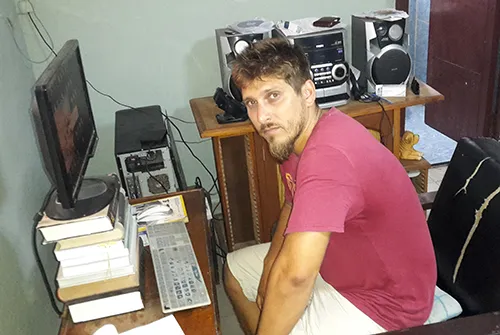
The OnCuba newsroom, with its coffee machine, conference room and reliable internet connection, seems like CNN world headquarters compared to the tumbledown operations of the monthly sports webzine Play-Off.
To upload stories and administer its website, Play-Off’s founder and editor Pedro Enrique Rodríguez sits at a bench in a public park in Havana that doubles as a Wi-Fi access point. He edits the magazine from the cramped basement apartment in Havana that he shares with his father and grandfather. On a spring afternoon, his cat darted through a window and settled on his lap while he worked at a computer that sits atop a stack of books, including one called The Great Battles of History.
Like many of Cuba’s nascent webzine founders, Rodríguez is engaged in his own great battle for editorial freedom and economic survival.
Rodríguez, 30, comes off as a kind of Cuban Bill Simmons, one of the first prominent internet sportswriters in the U.S. who is famed for his cantankerous, yet literate, opinions. Like Simmons, Rodríguez holds passionate views about players, coaches and athletic controversies but found no place for them within traditional media. He said he dreamed up Play-Off last year while watching a baseball game with his girlfriend and complaining about boring sports coverage in official media.
Play-Off looks like a Cuban version of Sports Illustrated, with page after page of lush photography and insightful essays. As he scrolled through the fifteenth edition on his computer, Rodríguez called Play-Off “my child.”
But like health and education, sports is one of the proud pillars of the Cuban revolution. Thus, coverage of baseball, soccer, track and field and other sports can be controversial.
One essay lamented the poor quality of Cuba’s Olympic athletes and pinned part of the blame on the island’s economic problems. Another article looked at proposed reforms to Cuba’s Baseball Hall of Fame and how those plans were shot down by sports officials who refused to consider including Cuban exile greats—like four-time World Series champion pitcher Orlando “El Duque” Hernández.
“These are absurd positions that make no sense,” Rodríguez says.
Rodríguez calls Play-Off “a sports magazine that’s not just about sports.” But for this reason he must proceed with caution. He said his aim is to publish a magazine that challenges conventional wisdom and government policies while staying within the boundaries of the government’s playing field for independent journalism.
For example, he said he is itching to publish an analysis of whether the quality of Cuban baseball is declining, in part, because so many top players are leaving to sign lucrative contracts overseas. Meanwhile, soccer is gaining ground with many youth now more interested in what the Brazilians call “the beautiful game” than “pelota,” Cuban slang for baseball. But Rodríguez said he has balked at assigning the story because he fears the government could retaliate by blocking his website in Cuba.
“We write from a critical viewpoint. But we can’t be as critical as we want to be,” he said.
So far, Rodríguez said, he has not had any reprisals for his work but, if Play-Off was closed he would give up hope of reforms in Cuba.
Play-Off is one of many new independent webzines that are testing the boundaries. They include the literary magazine El Estornudo, fashion and lifestyle publications Garbos and Venus, N1CKS for electronic games aficionados, and Vistar, an entertainment publication. Printing independent magazines is illegal, punishable by three months to one year in prison; however, these digital magazines can be read online or via PDF downloads and the law currently does not extend to web-based publications. Some webzines are available via The Packet. Influenced by a posse of young writers, Cuba’s new magazine journalism is “defining cultural tastes and aesthetics,” Cecilia Campos, of the Cuban non-governmental organization Asociación Pro Libertad de Prensa, wrote on the free-speech website Cuba Prensa Libre.
One of the most ambitious is El Estornudo, or “the sneeze,” a name that alludes to the chronic allergies or irritations of daily life in Cuba. El Estornudo publishes literary journalism and aims to be Cuba’s answer to Vanity Fair, Mexico’s Gatopardo or Colombia’s El Malpensante. Stories have included a profile of an impoverished Havana neighborhood, a piece slamming the lack of reforms at the Cuban Communist Party’s VII Congress in April following Obama’s visit to Havana, and an essay questioning whether there’s reason for optimism given the slow pace of change.
“We are exhausted, but we are enjoying this … The reason we exist is due to all the changes in Cuba.”
Abraham Jiménez Enoa, El Estornudo
It is rich fare—and a radical shift for Abraham Jiménez Enoa, a 28-year-old who studied journalism at the University of Havana and is El Estornudo’s founder and editor. After graduating, he monitored foreign press coverage of Cuba for the Interior Ministry. He said he hated the job but the university was churning out too many journalists for the ranks of Granma, Juventud Rebelde, and other traditional state media. After a few years at the ministry, Cuba’s independent press began to grow and Jiménez quit to freelance for OnCuba and El Toque. He launched El Estornudo in March.
Rather than directly criticizing government policies, El Estornudo often addresses them in a roundabout way through lengthy profiles. To discuss official corruption, for example, Jiménez spent days with a street vendor in Old Havana and recounted how the vendor was hit for bribes by policemen to continue operating. His writers have tackled subjects ranging from underground sex shops to the government’s apparent lack of concern for Cuban migrants who get stuck in transit countries such as Ecuador and Colombia while trying to reach the U.S. So far, Jiménez said, there has been no response from government officials, but he points out that his magazine is only a few months old.
Like Play-Off, El Estornudo is an austere undertaking with no office, no staff and no internet connection. Jiménez puts it together with the help of a group of literary-minded friends who write for free, and uploads stories and photos from Wi-Fi points. Although available on the web, Jiménez lacks the $15 weekly fee to place El Estornudo in The Packet. He said he has no idea how to turn his project into a sustainable business. But for now, he is simply thrilled by the challenge and the adrenaline rush of putting out his own magazine.
“We are exhausted, but we are enjoying this,” Jiménez said. “I am optimistic. The reason we exist is due to all the changes in Cuba.”
Except for a sex column, the fashion magazine Garbos mostly steers clear of controversial issues, including politics. But like Play-Off and El Estornudo, its editors, Rebeca Alderete, 35, and Gabriela Domenech, 26, face challenges in putting out Cuba’s answer to Vogue. For starters, they say Cuba isn’t much for haute couture.
In the 1950s, a more stylish era, the island was home to cabarets and casinos frequented by European celebrities and U.S. film stars. But Cubans began dressing down in the 1960s when the Castro revolution stressed equality and took some of its fashion cues from the Soviet Union. Foreign clothes brands weren’t sold on the island until the 1990s. That, combined with economic problems and Cuba’s tropical heat, discourage the wearing of fancy jackets, vests, scarves and other staples of high-end fashion.
“Cuba used to be more elegant,” Domenech said. “My grandmother always wore high heels.”
But with Cuba slowly opening up to the world, people now have more fashion choices, the editors said. In addition, the island is home to a handful of professional and would-be models as well as houses and buildings in Old Havana that provide elegant settings for photo shoots. Anxious to build up their portfolios with the glossy PDF pages of Garbos, actors, singers, models and photographers often pose and work for free.

Despite relatively low production costs, Alderete, a self-employed sound engineer, and Domenech, who works at the Culture Ministry, said they are struggling to stay afloat. Their business model is based on advertising. But because Cuba’s economy was totally controlled by the state for so long, they say there is little knowledge of advertising and its benefits.
As an example Alderete pointed to Cuba’s two main beers: Bucanero and Cristal. “Both are owned by the same state company,” she said. “There’s no competition, so why would they advertise?”
Managers of many state companies, in turn, often balk at buying advertising from Garbos and other webzines because they are not licensed. Due to the peculiarities of Cuba’s legal system, the only way to secure official recognition would be to first establish overseas offices, like OnCuba has, then register as a foreign entity on the island. And, while the lack of regulations means no formal punishment has been laid out, the recognized boundaries mean that state companies tend to err on the conservative side.
There is a small but growing private sector. Recent issues of Garbos included advertisements for family-run restaurants called paladares, bars, a tattoo parlor, candy stores, and a photocopying shop. The income is just enough to scrape by.
In May, Garbos scored a coup when the French fashion house Chanel staged its first Latin American catwalk show in Havana. To mark the occasion, Chanel personnel spent three months collaborating with Garbos on a special issue, providing clothes, technical assistance on shoots, equipment, and advice. But because Chanel’s luxury goods and fashion accessories are not sold in Cuba, the company did not purchase any advertisements, the editors said.
Rodríguez faces similar challenges in financing Play-Off. His monthly production costs of about $350 include fees for stories, for the layout artist and for inclusion in The Packet. He describes his freelancers as being among the best sports reporters working in government media. But, he said, they jump at the chance to write for Play-Off because he pays $10 per article compared to about $3 for state-run newspapers and magazines. In another sign of loosening media restrictions, the freelancers write under the same bylines they use in state media, Rodríguez said.
To cover these costs, Rodríguez said he makes the rounds at the beginning of each month to peddle advertisements to paladares, bars and privately owned bed-and-breakfast ventures that have sprung up in recent years. But he’s often shut out because owners spend most of their money on the nuts-and-bolts aspects of their businesses, such as food and alcohol.
“Publicity is the hardest part,” Rodríguez said. “Owners of paladares don’t believe in digital media. They don’t think it will help their businesses. I have to go to 20 paladares for one to say ‘yes.’ ”
As an informal business, Rodríguez cannot sign contracts with advertisers in the name of Play-Off or open a bank account. Deals are done verbally. He said he has yet to be let down by advertisers, but they sometimes pay several months late. He said that one solution—if the U.S. trade embargo was lifted—would be for a big American firm, like Nike, to step in and sponsor his magazine in exchange for exclusive publicity. But he has no contacts with the sportswear giant.
As he hammers on his keyboard and sips coffee, Rodríguez admits that he has moments of both ecstasy and despair.
On good days, he said he feels like a publishing pioneer pushing the boundaries. He got another boost in March when President Obama’s motorcade sped right past him through the streets of Havana. He said the improved ties between Havana and Washington send a strong signal that the Castro government is capable of reforms.
On bad days, he frets that these changes will come too slow for many of Cuba’s new media ventures—including his own.
“Play-Off is my offspring,” he says. “To see it die would be terrible.”
EDITOR’S NOTE: The third paragraph in the section on “News Websites” has been corrected to reflect that a survey conducted by Radio Ciudad del Mar did not affect call-in comments from listeners. In the 16th paragraph, the text has been corrected to reflect José Jasán Nieves’s statement that journalists working for OnCuba are rebelling against the status quo.